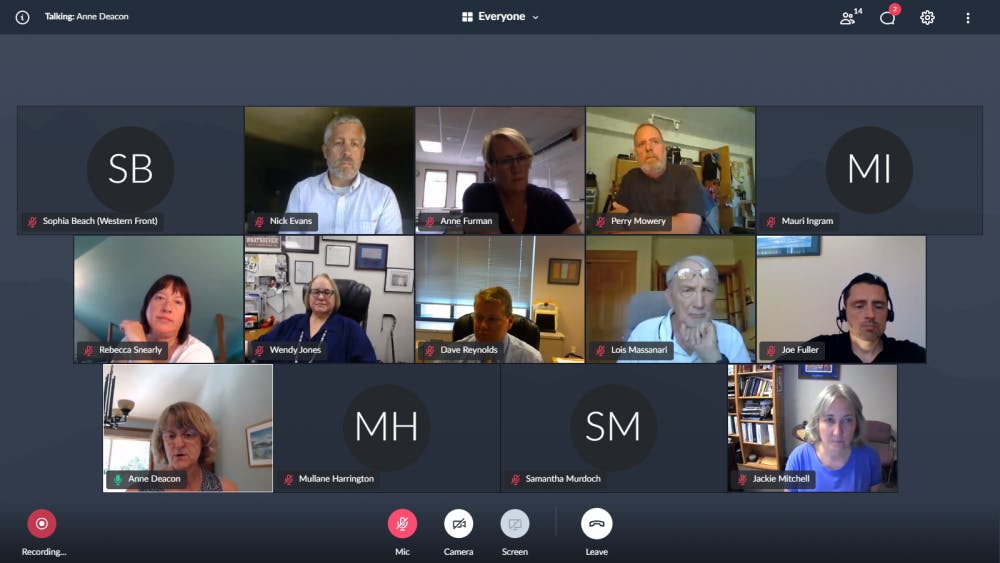Whatcom County faces huge cuts for mental health programs and staff.
By Sophia Beach

The Whatcom County Behavioral Health Advisory Committee proposed a $1 million cut to services during its meeting on July 27. The committee met to discuss the unpublished 2019-20 School Service Report and their proposed budget cuts for 2021.
The purpose of the committee is to prioritize behavioral health programs, including substance abuse and mental health, according to the Whatcom County Boards and Commissions website.
“Last year we brought in about $5 million and put out more than $5 million in programs and services,” said Anne Deacon, health department designee and human services manager for Whatcom County.
According to the Whatcom County Executives 2019-20 budget, the behavioral health program fund was budgeted $4,791,375 this past year.
The committee is currently experiencing a 24% decrease in revenue. This has led them to propose large cuts to behavioral health service programs for 2021, Deacon said.
Deacon said, “We are using behavioral health sales tax to fund the majority of our programs.”
According to the Whatcom County Executive’s budget, the fund collects 0.1% public safety and health sales to fund emergency medical services and criminal justice.
Six major areas could be affected by the cuts: Whatcom County Health Department staff, housing support (case management services and housing programs for people with behavioral health disorders), outreach and engagement, community treatment and support, and crisis stabilization center support, Deacon said.
The health department staff may face a budget cut of $371,286, Deacon said.
“We budgeted over $550,000 in staff to support these programs. We are proposing a significant cut,” Deacon said.
Deacon said this funding will be replaced by other sources in 2021.
Case management for housing support may be cut by $245,750, Deacon said. She also said housing support for those with behavioral health disorders may be cut by $137,950 but will be funded by other sources in 2021.
According to the Whatcom County Executives 2019-2020 budget, the homeless housing fund was budgeted for $3,896,868 this past year.
“The state department of commerce has given our county quite a few dollars for emergency housing for response to the COVID crisis,” Deacon said. “To the extent possible, some of these budget cuts will be offset by some of those dollars.”
Outreach and engagement may be cut by $40,000, however another undisclosed funding source has already assumed this cost, Deacon said.
Community treatment and support may be cut by $130,000. These services support treatment for homeless youth, domestic violence perpetrator treatment, consultation to the district court behavioral health unit and outpatient mental health treatment.
Domestic violence perpetrator treatment is a program that provides domestic violence assessments or intervention treatment to perpetrators of intimate partner violence and is certified by the Department of Social and Human Services (DSHS), according to the Washington State Legislature.
Mullane Harrington, PeaceHealth representative for the committee, said, “We have been alerted to a perpetrator program that costs nothing and in fact will bring revenue back into the county. But it requires prosecuting attorneys to refer people into this program.”
The program is called the Men’s Accountability Program. The 10-week program is located in King County, according to Seattle Against Slavery.
“[The program is] based on principles of social justice and personal transformation that’s designed to help men understand their behavior and promote their own decisions to not buy sex,” according to Seattle Against Slavery.
Harrington said the task force has struggled to gain traction with the program and reached out to the committee to bring awareness to it. If such a program were to be put in place it could accommodate the $130,000 cut from community treatment and support.
“We love things that don’t cost us anything, especially if they’re good programs. We’re always concerned that the quality of the programs we pay for are not only of high nature, but also are producing the outcomes that we expect,” Deacon said.
Michael Massanari, a mental health recovery advocate, commended Harrington for bringing it to the committee’s attention. Massanari said, “I commend you for looking into it far enough that you’re searching for alternative funding. It’s a little heartache to have to make cuts.”
Other possible budget cuts include $65,000 from crisis stabilization center support. This covers county facilities repair and maintenance costs, Deacon said.
Although over $6 million has entered the community for housing support since spring, Deacon said, there are restrictions on the funds that prevent them from directly replacing their budget cut.
“We can’t just use them to backfill some of these programs. But where we might be able to use it to help balance things, we are doing so,” Deacon said. “A lot of it is new money related to COVID-19.”
The committee also reviewed the 2019-20 School Services Report. Behavioral Health services in schools have proved beneficial to students, said Joe Fuller, program specialist for Whatcom County Health Department.
Fuller said that after contacting Whatcom’s seven school districts regarding behavioral health services in their schools, he collected a 17-page document of success stories. However, only a select few are included in the currently unpublished six-page report.
According to Fuller, 395 youth improved academics, 261 youth improved discipline and 242 youth improved attendance because of the behavioral health services offered in schools.
Fuller said, “Even with our schools shutting down, a lot of our mental health therapists continue to meet with their students virtually.”
He said that students don’t have their usual support system this year due to the pandemic taking away in-person classes.
“We need to be careful moving forward because we may see some spikes in depression and suicidal thinking,” Fuller said. “There is grief and loss because young people might not be able to experience certain milestones.”
The committee agreed that this meeting was a rather depressing introduction for their new member, Nick Evans, who is a substance use disorder advocate. The Behavioral Health Advisory Committee will meet once again on October 26.





